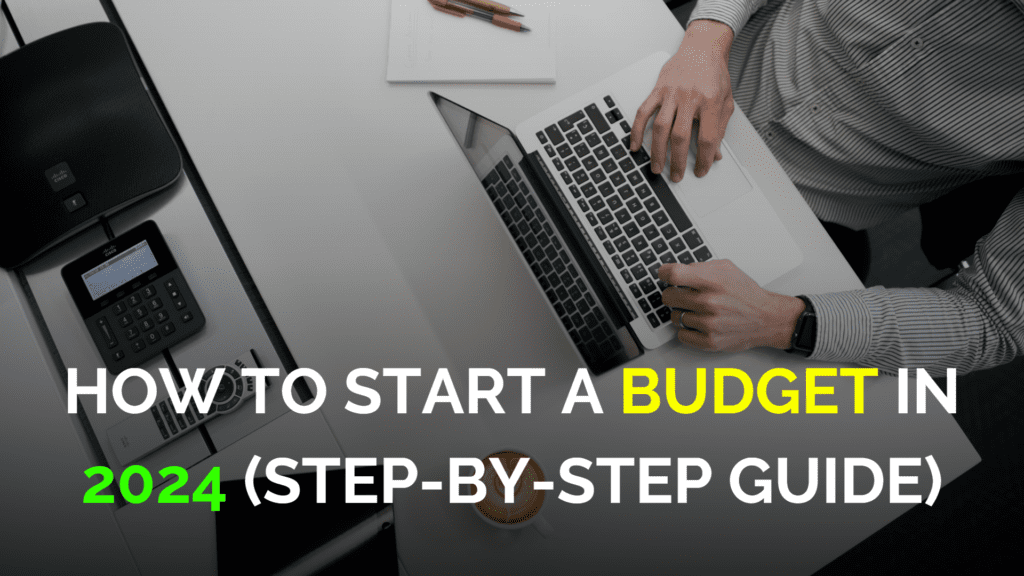Budgeting is the process of creating a plan for how you will spend your money. It is important to budget because it can help you save money, reach your financial goals, and avoid debt. Let’s go to the topic “how to start a budget“.
If you are a beginner, budgeting can seem daunting. However, it does not have to be difficult. There are a few simple steps that you can follow to create a budget that works for you.
Step 1: Calculate your income
The first step to creating a budget is to calculate your income. This includes all of the money that you earn from your job, side hustles, and investments.
Here are some examples of income:
- Salary
- Hourly wages
- Commissions
- Bonuses
- Tips
- Self-employment income
- Investment income
- Social Security benefits
- Disability benefits
- Retirement benefits
- Child support
- Alimony
Step 2: Track your spending
Once you know how much money you earn, you need to track your spending. This will help you to understand where your money is going each month.
There are a few different ways to track your spending. You can use a budgeting app, a spreadsheet, or simply write down your expenses in a notebook.
Here are some tips for tracking your spending:
- Be specific. When you are tracking your spending, be as specific as possible. This means writing down the date, the merchant, the amount, and the category of expense.
- Be consistent. Try to track your spending every day, or at least once a week. This will help you to get a more accurate picture of your spending habits.
- Don’t be afraid to leave anything out. It is important to track all of your expenses, even the small ones. This will help you to get a complete picture of your spending habits.
Step 3: Create a budget
Once you have tracked your spending for a month or two, you can start to create a budget or start a budget. This is where you will decide how much money you want to spend on each category, such as housing, food, transportation, and entertainment.
Here are some tips for creating a budget:
- Be realistic. When you are creating your budget, it is important to be realistic about your spending habits. You don’t want to create a budget that is too restrictive, or you will be more likely to give up. It will help you Start a budget.
- Prioritize your expenses. Some expenses are more important than others. For example, you may need to spend more money on housing and food than on entertainment.
- Set financial goals. What do you want to achieve with your money? Do you want to save for a down payment on a house? Pay off debt? Retire early? Once you know what your goals are, you can create a budget that will help you reach them.
Here is a sample budget:
Income
- Salary: $3,000
Expenses
- Housing: $1,000
- Food: $500
- Transportation: $200
- Utilities: $100
- Insurance: $100
- Debt payments: $200
- Savings: $500
- Investments: $100
- Other expenses: $300
Total expenses: $2,800
Net income: $200
If your net income is positive, that means that you are spending less money than you are earning. And Your net income is negative, that means that you are spending more money than you are earning.
If your net income is negative, you need to make adjustments to your budget until you are spending less money than you are earning. You can do this by cutting back on unnecessary expenses or by increasing your income.
Step 4: Review and adjust your budget
Once you have created your budget, it is important to review it regularly and make adjustments as needed. For example, if you find that you are spending too much money on one category, you can try to cut back in that area.
Here are some tips for reviewing and adjusting your budget:
- Review your budget at least once a month. This will help you to stay on track and make adjustments as needed.
- Be flexible. Your budget is a living document, so don’t be afraid to make changes as needed. If your life circumstances change, you may need to adjust your budget accordingly.
- Don’t give up. Budgeting can be a challenge, but it is worth it in the long run. By following the tips above, you can create a budget that will help you reach your financial goals.
Read More: How to Save Money on Groceries on a Tight Budget
Here are some additional tips for saving money:
- Cook more meals at home. Eating out can be expensive, so cooking more meals at home is a great way to save money. Here are some tips:
- Plan your meals ahead of time. This will help you avoid impulse purchases at the grocery store.
- Make a list of the ingredients you need and stick to it.
- Cook in bulk so you have leftovers for lunch or dinner the next day.
- Invest in a slow cooker or Instant Pot. These appliances make it easy to cook healthy meals without having to spend a lot of time in the kitchen.
- Pack your lunch for work. Packing your lunch is a great way to save money and eat healthier than eating out.
- Use coupons and promo codes. There are many ways to find coupons and promo codes for groceries. You can find them in newspapers, magazines, and online.
- Shop around for insurance. Insurance rates can vary widely, so it is important to shop around for the best deal. You can compare rates online or get quotes from different insurance companies.
- Cancel unused subscriptions. Do you have any subscriptions that you don’t use anymore? Cancel them to save money. This includes subscriptions to streaming services, magazines, and clubs.
- Use public transportation or ride a bike. If you live in an urban area, you may be able to save money by using public transportation or riding a bike instead of driving.
- Shop secondhand. You can find great deals on secondhand clothes, furniture, and other items at thrift stores, consignment shops, and online marketplaces.
- Make your own coffee. Buying coffee from a cafe can add up over time. Save money by making your own coffee at home. You can invest in a coffee maker or espresso machine, or simply brew coffee in a pot.
- Avoid impulse purchases. One of the best ways to save money is to avoid impulse purchases. When you see something you want, ask yourself if you really need it. If you can wait 24 hours before buying it, you may find that you don’t need it after all.
- Set financial goals. What do you want to achieve with your money? Do you want to save for a down payment on a house? Pay off debt? Retire early? Once you know what your goals are, you can create a budget and plan to achieve them.
Budgeting can be a challenge, but it is worth it in the long run. By following the tips above, you can start a budget that will help you reach your financial goals.









